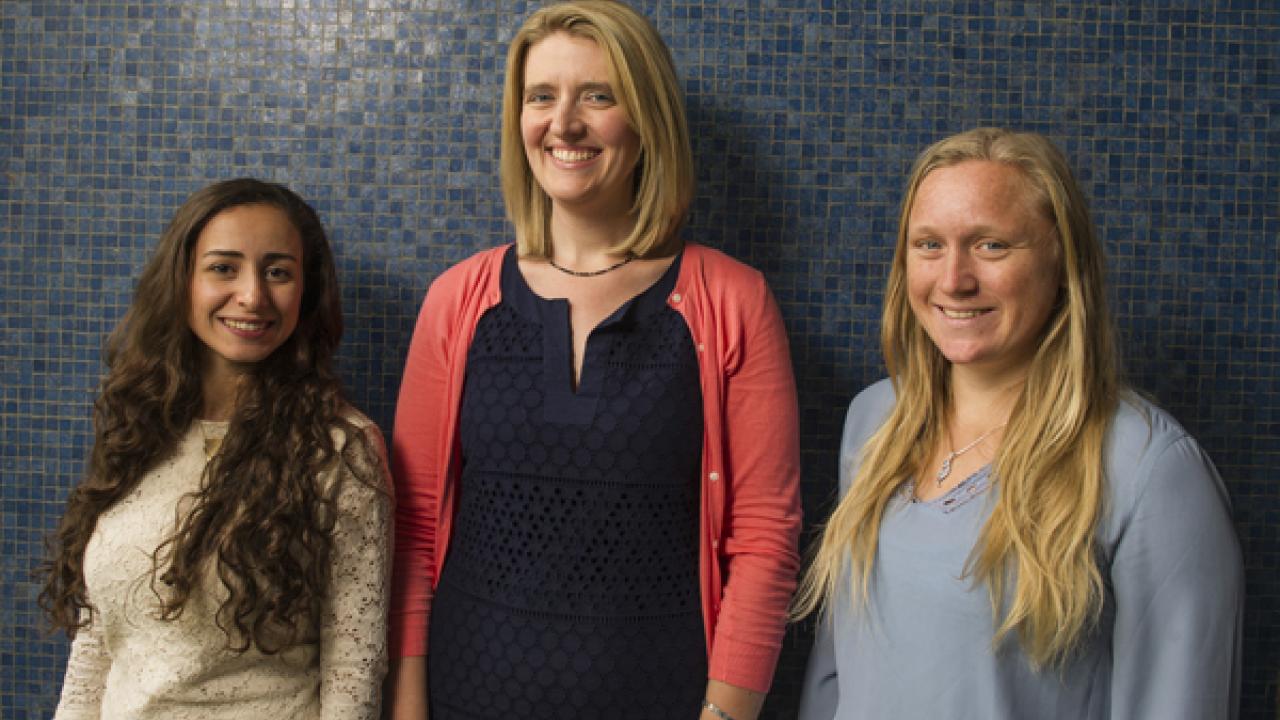
Mentoring Fellowship Awardees - Dr. Gail Bornhorst and Mentees Yamile Mennah and Krista Drechsler, Biological and Agricultural Engineering
What makes Dr. Gail Borhhorst a great mentor?
Quick Summary
- Her commitment to paying it forward.
Without excellent faculty mentors at both the undergrad and graduate levels, assisting with research, funding and sheer encouragement, Gail Bornhorst is certain she would not be where she is now: an assistant professor in Biological & Agricultural Engineering. Since turnabout is fair play, she strives to be as effective a mentor for her graduate students, now also her mentees, Yamile Govela and Krista Drechsler, both in biological systems engineering.
The Mentoring at Critical Transitions (MCT) program and its seminar series was an ideal pathway to this goal. Bornhorst, a relatively recent faculty addition, was impressed that the university offered a program that so strongly encouraged developing mentor/mentee relationships as well as specific mentoring projects.
Bornhorst’s project, “Enhancing teaching and presentation skills using microteaching principles,” earned one of the first five MCT fellowships to be offered. The project involves utilizing microteaching principles for delivering and receiving feedback on three modules over three quarters: a teaching lecture for a laboratory course, a short conference presentation, and a research seminar.
“Presenting is a very useful skill, but it’s an overlooked area, one that doesn’t always get taught in graduate school,” she says. “You are just expected to be good at giving presentations.” If presenters don’t receive feedback, how can they judge their effectiveness? In graduate school, Bornhorst rarely received detailed feedback about her presentation style or delivery. However, as her career matured, she was expected to present in more high-stakes situations, such as professional meetings or qualifying exams.
“Regardless of what your career is,” she says, “if you are getting a graduate degree, you will need to present in front of colleagues, stakeholders, or students. It will be advantageous to feel comfortable and organize your thoughts in a way that an audience can follow your message.”
One quarter in, Govela and Drechsler are already seeing the benefits of practice followed by feedback.
“It has been very helpful to see myself presenting in videos and noticing my delivery, movements, and other things,” Govela says, for whom English is a second language. “The first few times were a little weird; it is uncomfortable to see yourself in a video.”
Govela says she can more easily envision herself teaching a class without any delivery problems or anxiety. She is looking forward to someday presenting at scientific conferences abroad with her honed professional skills.
Drechsler agrees. “It helps a lot in identifying specific body movements or filler words that you do and may not necessarily be aware of while presenting.”
The MCT project has not only helped Drechsler manage her apprehension about oral presentations—which she admits do not come naturally to her—but has taught her how to organize them in a way that focuses on her audience. “Many presentations have too much text in the slides, but the audience cannot effectively read text-filled slides and pay attention to the speaker at the same time,” she says. “Pictures and symbols can more effectively convey messages.”
Bornhorst has also seen a marked advancement in her students’ presentation skills. “I’ll remind them, ‘Do you remember your first presentation, or the first time you talked in front of a lab section?’ and that reflection helps them to see that they actually have improved … even if they don’t believe me!”
Witnessing that development is valuable and encouraging for both sides of the mentor relationship. But MCT itself has tackled other difficult related topics for Bornhorst and her colleagues, such as “imposter syndrome,” setting expectations for students, and above all, bringing faculty together to discuss issues involved with student mentoring. “I always find it good to hear that many faculty members have the same challenges, and enjoy learning strategies others have used effectively.”
Bornhorst hopes to help set a good example for other mentor/mentee teams. “These types of mentoring projects redefine what it means to be a mentor for graduate students. They stress the tools and skills we can use to help our students improve their professional skills, which will help them ultimately be successful, in graduate school and beyond.”

